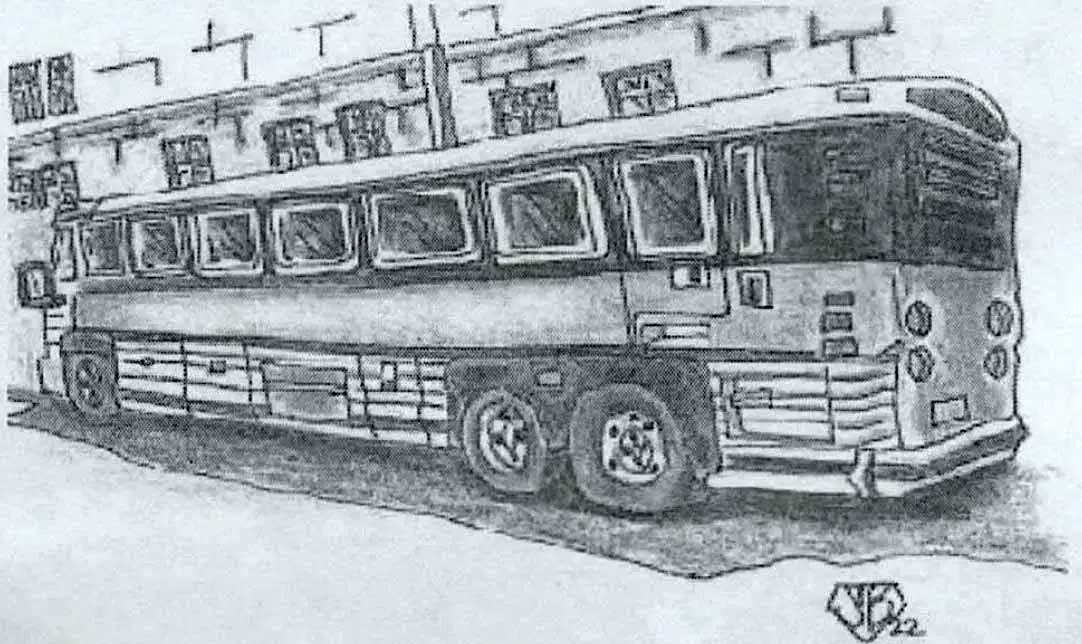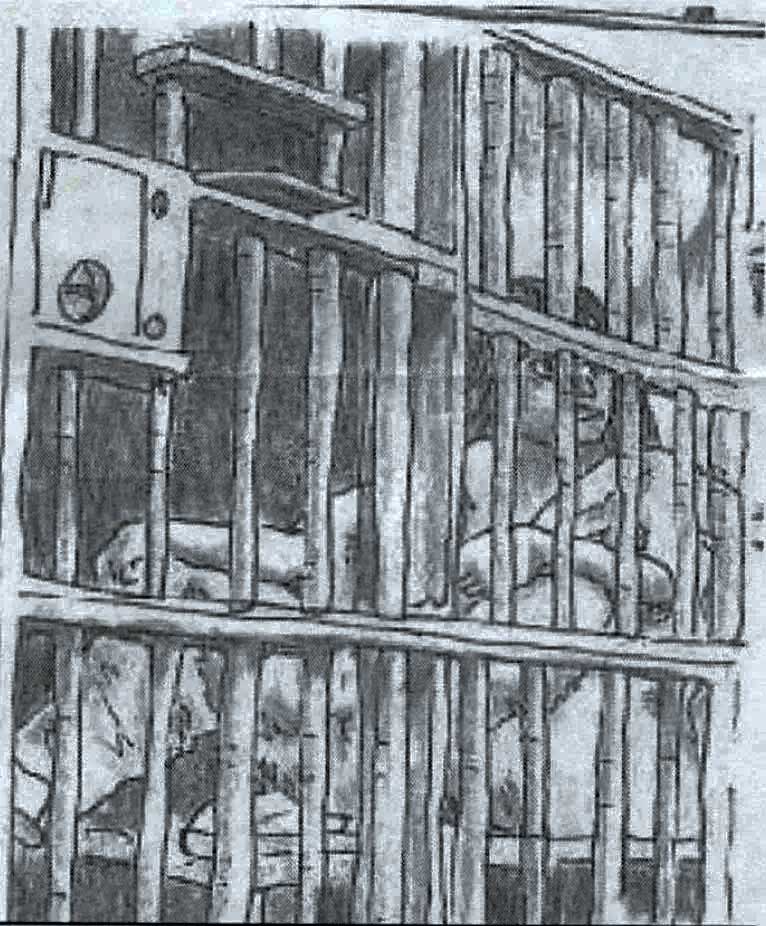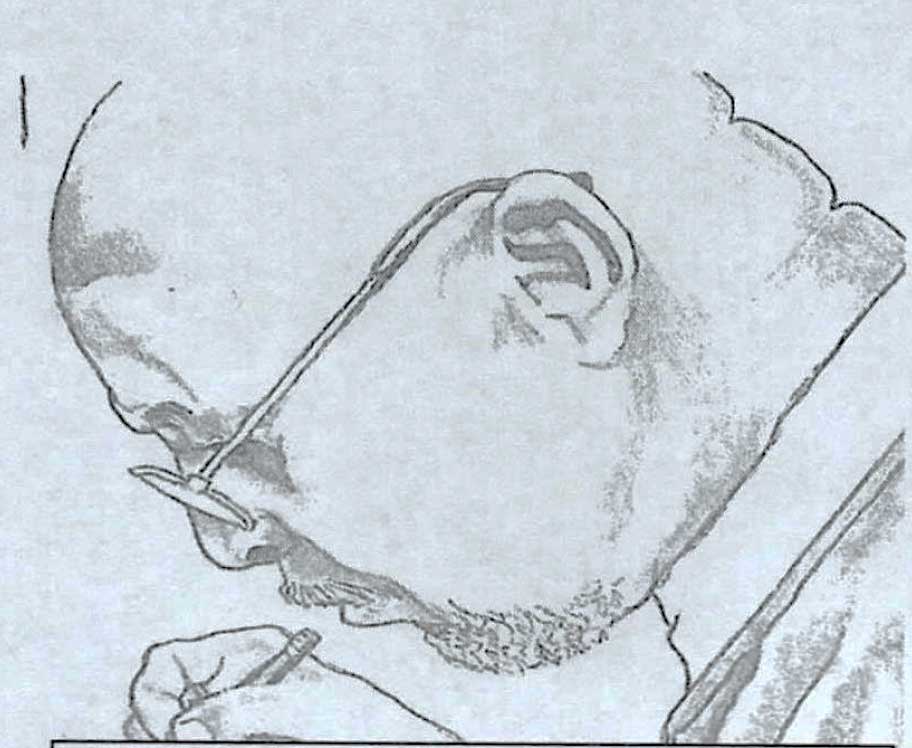Leg Irons, Memories of Service, and What Might Have Been Echo From Behind Bars
Editor’s Note: This story was published in partnership with San Quentin News and was written during a writing seminar for incarcerated veterans in April hosted by The War Horse at California’s San Quentin Rehabilitation Center. Tens of thousands of military veterans are incarcerated across the United States, and these stories are intended to shine a light on their unique needs, challenges, and experiences. Learn about the seminar here.
It was cold and wet when the door to my cell opened. An officer with a clipboard instructed me to step out and head to the officer’s desk. Beyond him, rain fell in heavy sheets.
“Hey, you! What’s your name and number?” the officer at the desk bellowed. It was 4:30 a.m., way too early to hear loud talk from anyone.
I answered his booming command just as I had back in Air Force boot camp in 1974, shouting: “Stanley, D66938, sir!”
He instructed me to walk to another officer standing at a nearby bus.
“But it’s raining, sir, and all I have on are flip-flops!” I said, hoping to appeal to his humanity.
“Now, Inmate!”
Flip-flops are no match against downpours, and by the time I reached the bus, I was soaked from head to foot. An officer cinched handcuffs onto my wrists. Then came a waist chain and leg irons and orders to step up and onto the bus.
The narrow steps were wet and slippery, making it hard to climb. The driver laughed at me in my awkwardness.
Inside the bus, country music played. “There will be no talking. Take a seat at the back next to the inmate who just sat down. And don’t ask us to change the music.”
Believe it or not, I liked country music.

A California Department of Corrections and Rehabilitation bus at its transfer destination. (Sketch by Mark Stanley-Bey)
My mind flashed back to scenes from the Air Force’s Induction Center, where drill sergeants barked orders not unlike these officers: Move it, soldier! And, to the man behind me, Next!
But that was more than a decade ago. Now it was 1987, and I was being transferred to the prison where I’d be doing most of my time.
Three years earlier, my wife, Lorraine, and I had just come home from church following her baptism. We’d ended up at the International House of Pancakes to celebrate. On the way, my wife had spotted a car dealership—a Chevy to be exact—and we decided to stop by there after our pancake breakfast.
Lorraine saw it first: a beautiful black and gray Camaro Z-28. She made a beeline for it and then looked back at me with pleading, puppy dog eyes. Meanwhile, I’d spotted a black and gray Corvette—my dream car.
I already knew we’d be leaving with that Camaro.
Besides, Lorraine was pregnant with a daughter we planned to name Mercedes, and a Corvette is perhaps not the most practical choice for a growing family.
We had so many reasons to be excited: Lorraine’s baptism, a new car, a new baby, a planned getaway to San Diego the following weekend.
But our plans came to a halt when I was arrested by two Los Angeles Police Department homicide detectives soon after that celebratory breakfast. For the next two years, I fought the charges, eventually losing to a second-degree murder conviction.
Now, I was on a bus headed to what was then called San Quentin State Prison, better known as “SQ” or simply “The Q,” California’s oldest prison opened nearly a decade before the start of the Civil War. When we arrived, the rain was still coming down, so heavy it seemed like it might never stop.
I have lost everything—my wife, my life, anything I thought was moving me to a better existence, I thought as I looked out the window of the bus.
I was snapped from that sorrowful thought as I began the receiving and release entrance process, or R&R, which was as draconian as the walls that rose up around me. Still wet from the rain, I received California Department of Corrections and Rehabilitation clothing and a bunk roll, which, to my delight, contained a large towel, underwear and socks, and “Old Man Comforts,” canvas shoes with rubber bottoms.
Award-Winning Journalism in Your Inbox
Man, it felt good to finally have on dry clothes, even if it didn’t stop the bone-deep chill I felt.
But just as I adjusted to a measure of comfort for the first time since that early morning wake-up, another officer stepped up to ask me my name and instructed me to fill out paperwork.
When will this be over? I wondered. R&R was a cold, damp, dark place, dimly lit by incandescent lights that belonged in a bygone era.

Waiting in a cell after arriving at San Quentin. (Sketch by Mark Stanley-Bey)
The other men from the bus were as wet, disoriented, and downright as tired as me. But before we had a chance to relax, an officer with yellow stripes on his sleeves came into the holding cell where we were now corralled. Some of us stood, and some, like me, sat on the cold, damp floor, the wooden benches having already been taken by inmates.
The officer with stripes announced that he was the sergeant of R&R—something I’d already gleaned having served in the military. His speech sounded rehearsed, no doubt from having done it many times before.
He told us what would happen next, sometimes shouting. A fellow inmate, noticing my comparative ease, asked if I’d done this before.
“No!” I told him, but I could not shake the feeling of having lived this before.
My mind drifted to my loving wife, to my children, to the thought of becoming a father to Mercedes.
“Stanley!” the sergeant bellowed. “When I’m talking and giving orders or instructions to you inmates, I expect you to pay attention and respond accordingly. Is that understood, Stanley?”
“Sir, yes sir!” I answered, and some of the guys couldn’t help but laugh.
I felt my body stiffen and become hot with anger and embarrassment.
After 40 years of a 15 year-to-life sentence, these are the details I can’t forget.
There were other transfers, to New Folsom and Old Folsom and back to S.Q.—now San Quentin Rehabilitation Center—with the same cinching cuffs and waist chains and leg irons that cut into my ankles. Along the way, I learned the unwritten rules and distinct culture of prison life: There is a hierarchy. Money is scarce and therefore held in high regard. Gambling and sex are good ways to end up shanked or dead.

Filling out Social Security forms for the first time in 40 years. (Sketch by Mark Stanley-Bey)
I avoided prison’s worst vices, and that is how I have survived.
Today, thanks to changing laws, I hope to walk out of prison free of the handcuffs and chains and leg irons that have defined my glimpses of the outside world for four decades.
California Penal Code 1170.91, passed in 2014, allows courts to consider military service as a mitigating factor during sentencing for felony offenses. This can include service-related post-traumatic stress disorder, traumatic brain injury, substance abuse, and mental health problems.
Our Journalism Depends on Your Support
This is not an effort to remove responsibility for my crimes but rather to explain how my experiences influenced my choices. It has taken me 40 years to understand this, to see that military service and my imprisonment were intertwined long before a prison officer ordered me to a bus in the rain.
This War Horse reflection was written by Mark Stanley-Bey, edited by Kristin Davis, and copy-edited by Mitchell Hansen-Dewar. Abbie Bennett wrote the headlines.





Comments are closed.